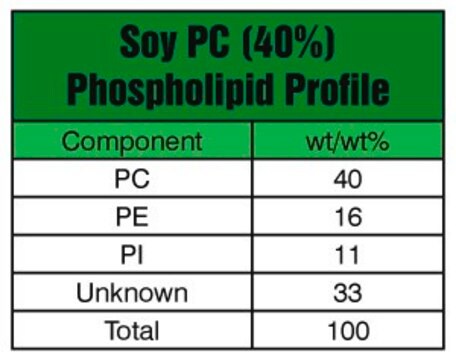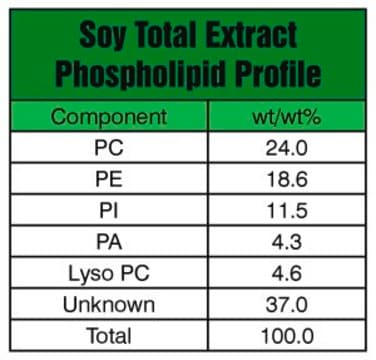541602C
Avanti
Soy Extract Polar
Avanti Research™ - A Croda Brand
Synonym(s):
Soybean Polar Lipid Extract
About This Item
Recommended Products
form
chloroform solution
packaging
pkg of 2 × 20 mL (541602C-1g)
pkg of 1 × 4 mL (541602C-100mg)
pkg of 5 × 4 mL (541602C-500mg)
manufacturer/tradename
Avanti Research™ - A Croda Brand
concentration
25 mg/mL (541602C-100mg)
25 mg/mL (541602C-1g)
25 mg/mL (541602C-500mg)
lipid type
lipid extracts
shipped in
dry ice
storage temp.
−20°C
General description
Application
- in the preparation of liposomes for forester resonance energy transfer (FRET)-based assay
- along with 1,2-dioleoyl-sn-glycero-3-phospho-L-serine (sodium salt) (DOPS) to mimic the cell membrane inner leaflet and for the preparation of giant unilamellar vesicle (GUV) connected to a multilamellar vesicle (MLV)
- in liposome preparation for the generation of GUV-MLV reservoirs
Biochem/physiol Actions
Packaging
Legal Information
Signal Word
Danger
Hazard Statements
Precautionary Statements
Hazard Classifications
Acute Tox. 3 Inhalation - Acute Tox. 4 Oral - Aquatic Chronic 3 - Carc. 2 - Eye Irrit. 2 - Repr. 2 - Skin Irrit. 2 - STOT RE 1 - STOT SE 3
Target Organs
Central nervous system, Liver,Kidney
Storage Class Code
6.1D - Non-combustible acute toxic Cat.3 / toxic hazardous materials or hazardous materials causing chronic effects
WGK
WGK 3
Flash Point(F)
does not flash
Flash Point(C)
does not flash
Certificates of Analysis (COA)
Search for Certificates of Analysis (COA) by entering the products Lot/Batch Number. Lot and Batch Numbers can be found on a product’s label following the words ‘Lot’ or ‘Batch’.
Already Own This Product?
Find documentation for the products that you have recently purchased in the Document Library.
Customers Also Viewed
Our team of scientists has experience in all areas of research including Life Science, Material Science, Chemical Synthesis, Chromatography, Analytical and many others.
Contact Technical Service












